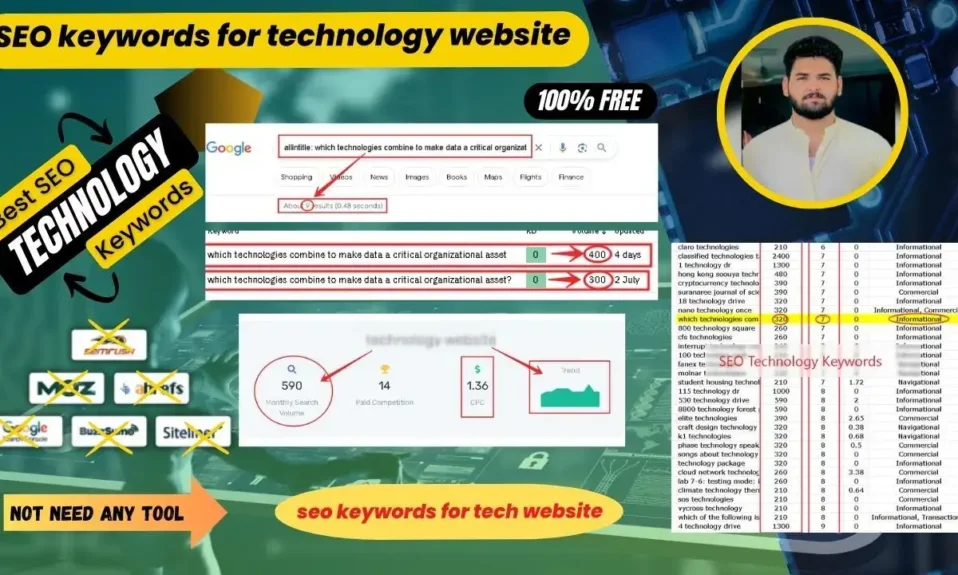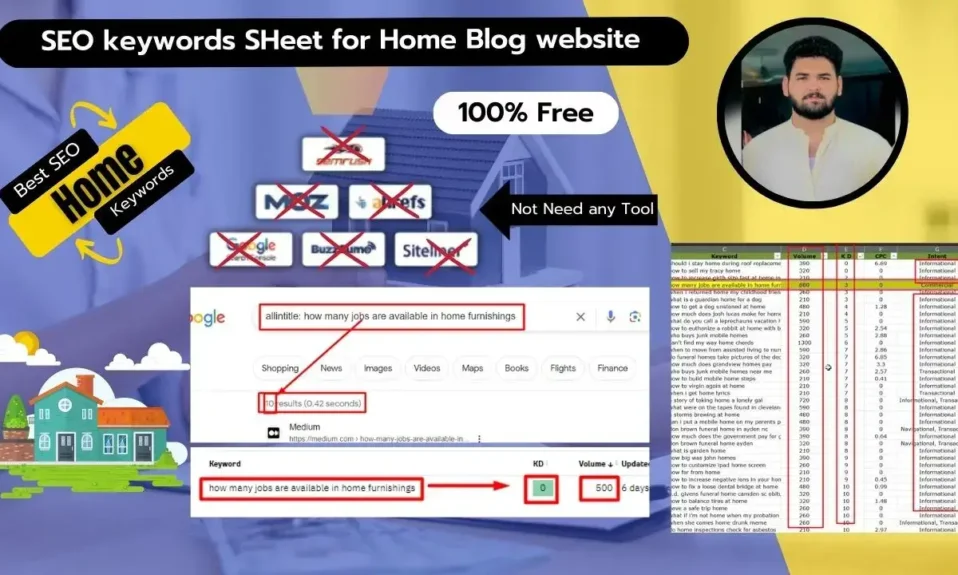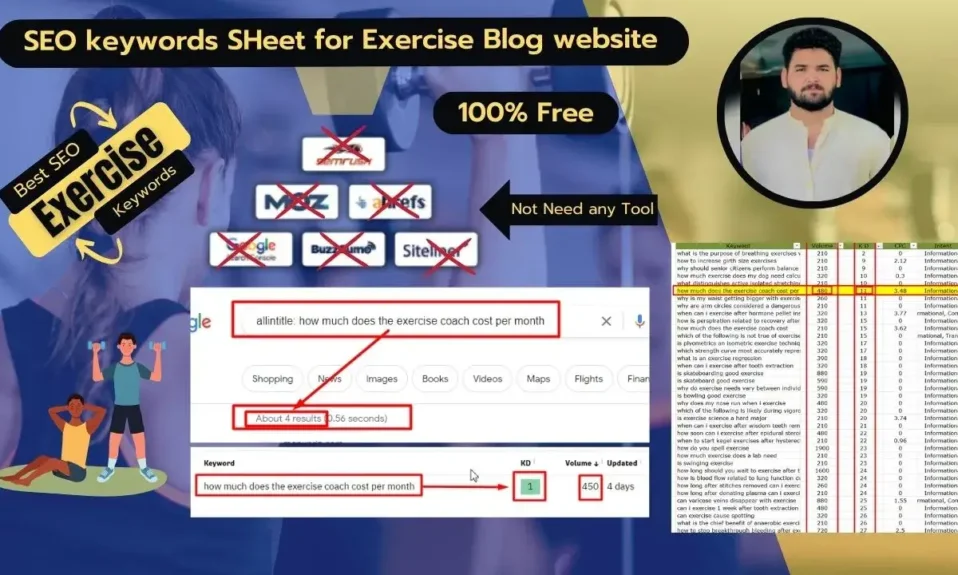
In the vast landscape of digital marketing, few aspects are as crucial as keyword research in the realm of Search Engine Optimization (SEO). A well-executed keyword strategy can make all the difference in boosting a technology website’s online visibility and driving targeted traffic to its pages. In this article, we delve into the significance of keyword research in the context of SEO for technology websites, exploring its role in enhancing search engine rankings and overall digital marketing success.
Understanding the Significance of Keyword Research in SEO
Keyword research serves as the foundation upon which an effective SEO strategy is built. It involves identifying the specific words and phrases that users enter into search engines when seeking information, products, or services related to the technology niche. By gaining insight into these search queries, businesses can optimize their website content to align with user intent, ensuring that they appear in relevant search results.
Why Technology Websites Need an Effective Keyword Strategy
In the ever-evolving tech industry, competition for online visibility is fierce. Without a well-crafted keyword strategy, technology websites risk getting lost amidst the sea of competitors. A focused approach to keyword research empowers tech websites to target their audience more effectively, attract organic traffic, and establish authority in their niche. Moreover, a solid keyword strategy lays the groundwork for other SEO efforts, such as on-page optimization, link building, and content marketing.
SEO Basics
Before delving further into the world of keyword research, it’s essential to grasp the fundamentals of SEO. Search Engine Optimization is the practice of optimizing a website to enhance its visibility on search engine results pages (SERPs). It involves various techniques and strategies to improve organic rankings and, subsequently, drive more qualified traffic to the website.
What is SEO?
SEO, in its essence, is the art and science of making a website more attractive to search engines. It involves a combination of on-page and off-page tactics that aim to improve a site’s relevance, authority, and user experience.
SEO Tutorial for Beginners: A Quick Overview
For those new to the concept of SEO, a comprehensive tutorial provides a valuable introduction to the fundamental principles and best practices. From understanding the importance of keywords to the significance of backlinks, beginners can gain insights into the various elements that constitute a successful SEO strategy.
The Role of Keywords in SEO
Daily Keywords Update are the building blocks of SEO. They act as the bridge between what users are searching for and what content a website offers. By incorporating relevant and well-researched keywords into their content, technology websites can optimize their chances of ranking higher in search results, ultimately driving more organic traffic.
Keyword Research Fundamentals
Effective keyword research requires a systematic and data-driven approach. This section explores the core principles of keyword research, equipping readers with the knowledge they need to conduct their research successfully.
What is Keyword Research?
Keyword research involves identifying the terms and phrases that users commonly use in search engines. It is a critical process in understanding what potential visitors are looking for and how to tailor content to match those queries.
How to Do Keyword Research: A Step-by-Step Guide
Conducting keyword research involves a series of steps, from brainstorming potential keywords to using specialized tools for analysis. A step-by-step guide provides readers with a clear and actionable framework to carry out their research effectively.
Free Keyword Research Tools to Get Started
Fortunately, there are several free keyword research tools available for beginners. These tools offer valuable insights into search volume, competition, and related keywords, empowering website owners to optimize their content without breaking the bank.
Google Keyword Research: Leveraging Google’s Resources
As the most widely used search engine, Google provides its own set of keyword research tools. From Google Trends to Google’s Autocomplete feature, understanding how to utilize these resources can yield valuable data for a successful keyword strategy.
The Importance of Long-Tail Keywords in the Technology Niche
While short and generic keywords are competitive and may attract a broad audience, long-tail keywords offer a unique advantage in the technology niche. These longer, more specific phrases may have lower search volume but higher intent, making them highly valuable for capturing targeted traffic and driving conversions.
Tech-Related Keywords: Uncovering Opportunities
The tech industry is brimming with diverse topics and trends, making it essential to identify and prioritize relevant tech-related keywords for SEO success.
Exploring Technology Keywords for SEO: An Overview
Technology keywords span a wide array of subtopics, from software and hardware to emerging tech trends. Understanding the landscape of technology-related search queries allows businesses to tailor their content to match user intent effectively.
How to Identify and Prioritize Tech-Related Keywords
To stand out in the competitive technology sector, businesses need to identify the keywords that resonate most with their target audience. Through data analysis and competitor research, they can discover high-value keywords to optimize their content around.
Low Competition Keywords: The Key to Ranking Higher
While high-volume keywords are enticing, they often come with intense competition. Exploring low competition keywords presents an opportunity to rank higher in search results, especially for newer or smaller technology websites.
Leveraging Keyword Research Tools for Tech Keywords
Various keyword research tools specialize in the tech industry, offering insights into popular tech-related searches, trending topics, and related phrases. Leveraging these tools can provide a competitive edge in targeting the right audience.
SEO Keywords for Technology Websites
With a comprehensive understanding of keyword research fundamentals and tech-related keywords, it’s time to explore the practical aspects of implementing keywords on technology websites.
The Process of Implementing Keywords on Technology Websites
Keyword implementation involves strategically integrating target keywords into various on-page elements, such as headings, body content, and meta tags. This process ensures that search engines and users can easily identify the website’s relevance to specific search queries.
Integrating Keywords into Website Content and Meta Tags
Creating high-quality, keyword-rich content is pivotal to SEO success. Integrating target keywords into blog posts, product pages, and other website content improves the site’s overall relevancy and boosts its chances of ranking higher.
Optimizing URLs and Permalinks for Better Keyword Impact
In addition to content, optimizing URLs and permalinks with relevant keywords enhances the website’s overall SEO structure. Descriptive URLs improve user experience and help search engines understand the page’s content better.
Internal Linking Strategies with Focus Keywords
Internal linking, the practice of linking to other pages within the same website, is a powerful SEO tool. Utilizing focus keywords as anchor text in internal links strengthens the site’s information architecture and improves its crawlability.
YouTube Channel Keywords
YouTube has emerged as a prominent platform for tech-related content, making it crucial for technology websites to optimize their YouTube channels with the right keywords.
Channel Keywords in SEO: How They Affect YouTube Rankings
Just like website content, YouTube videos are indexed and ranked based on relevance. Channel keywords play a vital role in improving a channel’s visibility and attracting a broader audience.
How to Add Channel Keywords for YouTube: Step-by-Step Guide
Optimizing a YouTube channel involves adding relevant keywords in the right places. A step-by-step guide equips content creators with the knowledge they need to improve their channel’s SEO.
Best Practices for Optimizing YouTube Videos with Keywords
Beyond channel keywords, individual video optimization is equally crucial. Implementing keywords in video titles, descriptions, and tags enhances discoverability and increases the likelihood of video recommendations.
Keyword Research for Blog Posts
Incorporating keywords into blog posts is an art that requires finesse. This section explores best practices for using keywords to craft engaging and SEO-friendly blog content.
Utilizing Keywords for Blog Posts: Best Practices
The successful integration of keywords into blog posts strikes a balance between catering to search engine algorithms and providing valuable content to readers. Best practices ensure that blog posts are both SEO-friendly and engaging.
Crafting Engaging and SEO-Friendly Blog Content with Keywords
Keywords should naturally fit within the context of blog content without feeling forced or disrupting the flow. Crafting engaging blog posts that resonate with the audience while maintaining keyword relevancy requires a thoughtful approach.
The Importance of Title Tags and Meta Descriptions in Blog SEO
Title tags and meta descriptions are essential elements that directly impact a blog post’s click-through rate in search results. Incorporating keywords strategically in these elements can significantly improve a blog post’s visibility.
Local SEO for Technology Businesses
For technology companies with a physical presence or a localized target audience, local SEO is essential to attract nearby customers and clients.
Localized Keyword Research for Technology Companies
Local keyword research focuses on identifying location-specific search terms. For technology companies with regional or city-specific offerings, understanding local keywords is vital for attracting relevant local traffic.
Leveraging Location-Based Keywords for Better Visibility
Incorporating location-based keywords into website content and metadata enhances the chances of appearing in local search results. This strategy is particularly valuable for technology businesses serving specific geographic areas.
Google My Business and Local Citations for Local SEO
Claiming and optimizing a Google My Business (GMB) listing is a critical step for local SEO. Furthermore, maintaining accurate local citations across various online directories and platforms reinforces a company’s local presence.
Keyword Research for Hindi Blogs (कीवर्ड रिसर्च क्या है)
Hindi blogs are a vital part of the digital landscape, catering to a diverse audience. Conducting keyword research in Hindi presents its own set of considerations and opportunities.
कीवर्ड रिसर्च क्या है: हिंदी ब्लॉग के लिए एक महत्वपूर्ण गाइड
हिंदी ब्लॉग के लिए कीवर्ड रिसर्च कैसे करें: चरण-बदरचीनी गाइड
हिंदी कीवर्ड रिसर्च में लोकल खोज की महत्वता
Conclusion
Keyword research remains a foundational pillar in the ever-changing world of SEO and digital marketing. Understanding the significance of keywords and how they intersect with technology websites and content creation is paramount for online success. By leveraging keyword research tools, embracing long-tail keywords, and optimizing content strategically, businesses can carve their niche in the technology landscape and stay ahead in the competitive digital realm. As the digital landscape continues to evolve, staying well-versed in keyword research and SEO best practices remains critical for any technology enterprise seeking to thrive in the digital realm. Armed with a well-crafted keyword strategy, businesses can navigate the intricate world of technology keywords and SEO with confidence, unlocking the potential for sustained growth and visibility on the digital frontier.










3 Comments